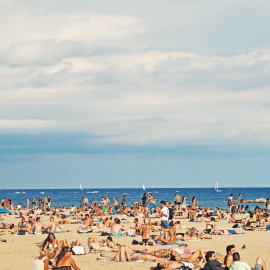The Leisure Edge
-
English
-
ListenPause
[intro music] Welcome to World Ocean Radio… I’m Peter Neill, Director of the World Ocean Observatory. The edge where land and sea intersect can be depicted as a place for leisure. We go there for a solitary walk, a romantic walk, the gathering of family, a place for children to play and remember, a rendezvous of friends where we eat and drink and sing songs before an open fire, waves crashing just beyond our line of sight, where we can relax in freedom from our worldly concerns. The beach has been portrayed culturally in art and literature: seascapes of curving sand, enveloping dunes, waves benign, and men and women in out-of-fashion bathing suits. The primary and secondary dunes that typically separate the beach from land are like protective curtains of privacy, natural grassy barriers that keep the implication of return to work and daily life apart. Long stairs descend, the sting of sand is felt, the smell and sound of the ocean displaces cares and concerns left behind, even for an afternoon. While beaches were at one time a place for work—harvesting fish and shellfish from alongshore—they have now become a space for leisure, even when they pass before some mighty row of private residences, condominiums, and hotels that in modern times have encroached forward to diminish the border of the regenerative sea. There is erosion there—not just the inundation by storm waves to undermine the foundations of those intrusive structures—but also by the dissolution of other protections there that have always sheltered land from sea. Beaches are privatized; resorts and clubs claim exclusive lengths of the endless sand; entertainment piers are built as artificial land on which the culture of rides and cotton candy can extend. Suddenly, there is manufacture for the compulsively active: gas-powered vehicles, small boats and kayaks to rent, surf and paddle boards, wind surfers and sail kites, vendors, even hustlers and beggars who prey on the distraction of fun. Suddenly there is landside music everywhere, the shells and driftwood are collected and burnt; the birds’ nesting grounds trampled; the sand and beach grasses clogged with plastic detritus, broken glass, and garbage. Suddenly, what has happened? Suddenly, the openness and tranquility and value of that edge is gone. This seems all wrong to me. I say the beaches belong to everyone, the coast around. Every beach is a reserve, a protected area for natural systems, marine creatures, sea birds, coastal flora and fauna and people. Yes, all the people who will use it sustainably, leave their destructive habits and unrecyclable junk on land already despoiled, and value the edge for all its natural capacity for recreation, renewal, and regeneration. Some states have done so, declaring the coast from top to bottom a public amenity. Some cities have done so, building public access and pathways the whole way round in place of exclusive commerce and industrialization that can be better placed somewhere else . Call me a revolutionary, but I say free the ocean edge, give it back in pure form so we can all enjoy the plentitude it gives us. Let the kids play and swim without equipment; let them search the tide pools for the critters that live there; let them feel things, like wet and hot, dry and cold. Let them come to the edge in all seasons so they can experience change, feel anger and solace in the sound of the sea, be by themselves if they want to be, and be together in a place where they can connect authentically, to each other, siblings, parents, even strangers, in a community of pure value, natural structure, and rewarding behavior. Let’s take back the edge. We will discuss these issues, and more, in future editions of World Ocean Radio. WORLD OCEAN RADIO IS DISTRIBUTED BY THE PUBLIC RADIO EXCHANGE AND THE PACIFICA NETWORK FOR USE BY COLLEGE AND COMMUNITY RADIO STATIONS WORLDWIDE. FIND US WHEREVER YOU LISTEN TO YOUR FAVORITE PODCASTS AND AT WORLD OCEAN OBSERVATORY DOT ORG.
We have long enjoyed the ocean edge for leisurely ends: as a place to gather with family and friends to enjoy surf and sand, and to relax in the freedom and solace that being near the ocean provides. In this episode of World Ocean Radio we argue that we must reclaim the spaces near the ocean edge for recreation, for coastal protection and for authentic connection to the sea. The Leisure Edge is part 4 of a 7-part series dedicated to the ocean edge, exploring what takes place there, from the real to the symbolic.
About World Ocean Radio
World Ocean Radio provides coverage of a broad spectrum of ocean issues from science and education to advocacy and exemplary projects. World Ocean Radio, a project of the World Ocean Observatory, is a weekly series of five-minute audio essays available for syndicated use at no cost by college and community radio stations worldwide.
Image Credit
Federico Giampieri on Unsplash
- Login to post comments



